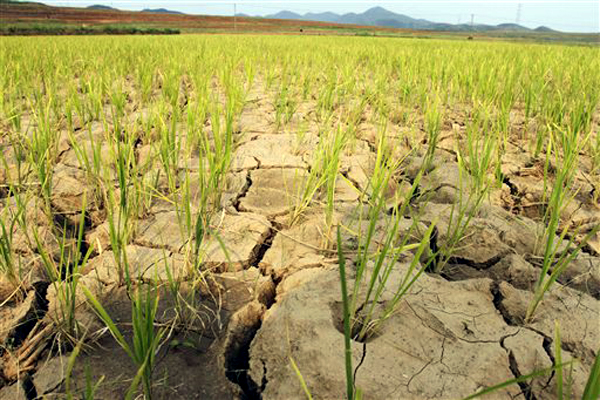
In this June 22, 2012 photo, rice plants grow from the cracked and dry earth in Rongchon-ri, North Korea, in the country’s Hwangju County. AP
SEOUL—North Korea’s white-collar workers have been deployed to farming areas across the country to help fight against drought, state media said, as the impoverished nation struggles to prevent heavy crop damage.
The isolated, nuclear-armed nation — which is under multiple sets of sanctions over its weapons programmes — has long struggled to feed itself and suffers chronic food shortages.
The country is highly vulnerable to natural disasters including flood and drought due to chronic lack of infrastructure, deforestation and decades of state mismanagement.
The North’s Rodong Sinmun newspaper reported government officials as well as company and factory workers were “actively joining the fight in drought-prone regions”.
“As soon as they arrived at the site, they immediately started watering, working shoulder-to-shoulder with farmers as they waged a fierce battle with nature,” the Wednesday report added.
The report did not specify the damage so far, but said the efforts were aimed at countering the ongoing dry spell as well as “preventing crop damages from drought in advance”.
The dry spell was forecast to continue throughout the week, the official KCNA news agency said citing the country’s weather agency.
There was a chance of “slight rain” on Friday, “but it will not be helpful in dissolving the drought”, it added.
North Korean leader Kim Jong Un has called for measures to improve the “tense” food situation, caused by the pandemic, typhoons and international sanctions over the country’s weapons programmes.
North Korea has been living under a rigid self-imposed coronavirus blockade since early 2020 to protect itself from the pandemic, although it briefly resumed trade with China early this year.
North Korea has yet to confirm a single coronavirus case.
The North has a fragile economy and has long been criticised for prioritising its military and banned nuclear weapons programmes over adequately providing for its people.
The country has periodically been hit by famine, and hundreds of thousands of people died — estimates range into millions — in the mid-1990s.
RELATED STORIES
Global problems may exacerbate shortages in North Korea’s isolated economy
Both Koreas suffering worst drought in a century
South Korea vows to send aid to North quickly, may send food
North Korea suffering severe drought—state media